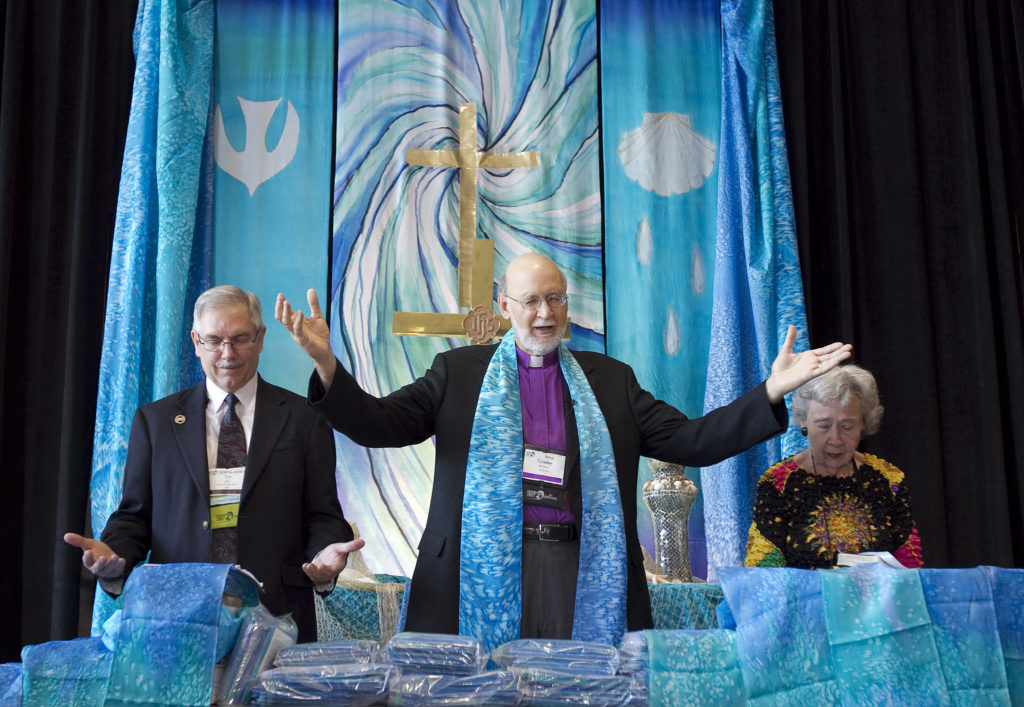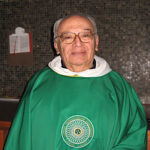Timothy W. Whitaker is a Retired United Methodist Church bishop who served the Florida Area.
UM Voices is a forum for different voices within the United Methodist Church on pressing issues of denominational concern. UM Voices contributors represent only themselves and not IRD/UMAction.
In the Epistle to the Colossians, before Paul speaks to the needs of the Colossians in a way that fits their cultural milieu and that addresses some false teaching that had arisen in the church, Paul proclaims the gospel of God concerning his Son. The gospel is expressed in the form of a hymn in 1:15-20. The primary message in this hymn is that the Son of God, Jesus Christ, has “first place in everything” (1:18). The old Israelite idea of the authority and preeminence of the “firstborn” son is used to express the preeminence of the Son in fulfillment of Psalm 89:26-27.
Communicating the revealed gospel requires discerning how people in a particular culture will hear and be able to receive the message of salvation. In this epistle, Paul is aware that people in Asia Minor had a longing for experience, and so Paul speaks of “Christ in you, the hope of glory” (1:27). He also emphasizes that they should “seek the things that are above, where Christ is, seated at the right hand of God” (3:1) because the people tended to think in terms of sacred space.
With this background in mind, Paul teaches how discernment requires the church to confront the culture with the truth of the gospel. Paul will not allow the church to be adulterated by false teaching which was becoming popular among the new Colossian Christians, and that is why he forcefully rejected the ascetic cult of angelic experience by proclaiming the exclusive primacy of Christ: it is in Christ, not in the angels, that “the whole fullness of deity dwells” (2:9), and Christ is the “substance” of reality now and in the future whereas all the religious endeavors being promoted by the false teachers constitute a mere “shadow” of the real thing (2:17).
The need to push back against the false teaching and the danger of being deluded by the Asian natural religion also cause Paul to stretch his metaphor of the church as the body of Christ by emphasizing what is always implicit in this metaphor, namely that Christ is the head of the body. It is Christ the head who enables the body to be nourished and held together so that it may “grow with a growth that is from God” rather than trying to grow from their own experience or from conforming to their surrounding culture (2:19).
Colossians 3:1-4:6 constitutes Paul’s application of the gospel to the way members of the church are called to live.
In a speech, Markus Barth, a son of Karl Barth, said that Colossians teaches that the “alternative to false religion is Christian conduct.” Paul teaches the Colossians to “put to death…whatever in you is earthly: fornication, impurity, passion, evil desire, and greed (which is idolatry)” (3:5). Instead, the new Christians are called to reject “the ways you also once followed,” and to accept “the new self, which is being renewed in knowledge according to the image of its creator” (3:7, 10).
In the church, which is the vanguard of the new humankind, Christians should “let the peace of Christ rule in your hearts” as they live their lives as “one body” (3:15).
Paul teaches the Colossians the same message he taught the Galatians in Galatians 3:28, “For there is no longer Jew or Greek, there is no longer slave or free, there is no longer male and female; for all of you are one in Christ Jesus.” In Colossians 3:11, Paul says that their renewal in knowledge according to the image of God through Christ means that “there is no longer Greek and Jew, circumcised and uncircumcised, barbarian, Scythian, slave and free, but Christ is all and in all!”
Modern sensibilities are offended by Paul’s admonition to slaves to “obey your earthly masters in everything” (Colossians 3:22). However, Paul has already sown the seed of the transformation of society by beginning with the plea for the spiritual equality and liberty of one slave in one house church as an example, but he also has a responsibility in his place and time to avoid interrupting the redemption of the world through the faithful living of the church, the body of Christ, and to avoid precipitating a violent revolution in society that would be destructive of both church and society.
The church is a distinctive community that is different from the rest of the world, but it has a responsibility to be a witness for Christ to the world. This witness contains a creative tension between being gracious and seasoning with salt. Christians are to be caring, but Christians also have to be willing to sting like salt in bearing witness to the hard truth.
Paul wrote the Epistle to the Colossians because Epaphras brought him news of the intrusion of false teaching into the house churches in Colossae. The style of this epistle, at least compared to its companion–the Epistle to the Ephesians/Laodiceans, indicates that it was dictated in haste. This hastiness shows a sense of urgency on behalf of Paul and his team. The reason they acted urgently is because of their care of souls.
“Mainline” Christians do not show such urgency when they become aware of teaching that is not in accord with the gospel and the Christian tradition. Today there might be a shrug of the shoulders. After all, this is a pluralistic society, and mainline Christians have a close and cozy relation with their culture and consider variations from Christian teaching to be a part of “diversity.” The apostolic tradition, as every book of the New Testament demonstrates, had a quite different attitude and approach.
The problem with heresy is not merely that it is mistaken, but that it is cruel. In his remarkable study, The Cruelty of Heresy: An Affirmation of Christian Orthodoxy (Morehouse, 1994), Episcopal Bishop C. FitzSimons Allison wrote, “We are susceptible to heretical teaching because, in one form or another, they nurture and reflect the way we would have it be rather than the way God has provided, which is infinitely better for us. As they lead us into the blind alleys of self-indulgence and escape from life, heresies pander to the most unworthy tendencies of the human heart. It is astonishing how little attention has been given to these two aspects of heresy: its cruelty and its pandering to sin.”
In his Epistle to the Colossians, Paul and his team never pander to sin, but they also recognize the cruelty of the false teaching being spread in Colossae, and they guide the Colossians to receive the healing of the gospel.
Paul identifies the cruelty of the heresy in Colossae. The teaching that the cosmos is determined by the elemental spirits of the universe is “empty deceit” which threatens to put Christians into intellectual and spiritual captivity (2:8). The attempt to “condemn” the Colossian Christians “in matters of food and drink or of observing festivals, new moons, or sabbaths” would rob them of the evangelical liberty they have received when they believed the gospel that Christ has “disarmed the rulers and authorities and made a public example of them, triumphing over them in it” and that he “forgave all our trespasses, erasing the record that stood against us with its legal demands” (2:16,15,13-14).
It seems that the essential cruelty of the false teachers’ heresy is that it offered a false remedy for deep-seated human anxiety. Because there is a cosmic fault, a wrongness in the way things are, anxiety is ever present. The false teachers advocated submission to the elemental spirits of the universe, control of things by observance of a calendar, and a severe self-discipline of the body. These were all attempts to push away anxiety, but anyone who tries these ways will eventually discover their futility, or be severely damaged by trying. Paul offers the only remedy to anxiety there is, which is the gospel concerning God’s Son, Jesus Christ.
Instead of anxiety, the gospel engenders thanksgiving. If anyone in Asia or the Roman Empire happened to see or hear this epistle, they would hear the good news that the only liberation from anxiety in the cosmos is belief in the gospel of Jesus Christ. They would be intrigued by the proclamation of Christ as the mystery who is the answer to the mystery of life, they would be energized by the muscular message about the way to live, and they would seek with all of their being to be rescued from the power of darkness and transferred into the kingdom of God’s beloved Son.
Even today there are people looking for a message and a church like that.





Comment by Dan on March 17, 2020 at 11:01 am
Excellent! Bishop Whitaker was my pastor over 30 years ago (the best one I ever had while a UMC member) and I also had the privilege to have dinner once with bishop Allison. I wonder how many UMC churches would dare to offer a Sunday school study on bishop Allison’s book? I’ve read it and it is outstanding. Although I’ve left the UMC for the LCMS, I was always struck by how much emphasis was given to the supposed 4 legged stool of Methodism – scripture, tradition, reason, experience; with experience being given the greatest emphasis and morphing into emotion. We’ve now moved into the realm of moralistic, therapeutic deism and mostly left any form of orthodox Christianity behind, and this is not unique to the UMC.
Comment by Roger on March 17, 2020 at 5:37 pm
In this article, I find a few things that seems to be left out. 1) Is the Gospel Paul preached, which is 1 Corinthians 15: 1 – 4. By believing this Gospel, believers have been translated into the Body of Christ, who has redeemed us through his blood, even the forgiveness of sins. ( I Corinthians chapter 12 gives the anology of the Body of Christ.) 2) For in Jesus Christ dwells all the fulness of the Godhead bodily. 3) Paul was bothered by Judaizers trying to tell his Church they had to follow the law. 4) His Gospel only requires faith / belief. Paul’s Churches had no scriptures except by mouth or his letters.
Comment by Tim on March 18, 2020 at 9:48 am
Here is what happened to the Episcopal Church and the same thing is happening to the United Methodist Church. Great video and explanation.
https://www.youtube.com/watch?v=VOygMm7LNBo
Comment by Paul DeFrank on March 19, 2020 at 9:01 am
Thank you for sharing. It really is amazing at how similar the Methodist issue is.
Comment by Geary on March 21, 2020 at 9:56 am
This link, buried in the comments here, is an amazing lesson of what happened to the Episcopal Church. It’s a mirror image of the decline into oblivion of Methodism. I sit here weeping for the Church!
Comment by David on March 19, 2020 at 8:10 am
‘Modern sensibilities are offended by Paul’s admonition to slaves to “obey your earthly masters in everything”’ It is not just sensibilities that are offended, but basic morality. Combined with the sanction atrocities of the Old Testament, they cast serious doubt on the moral authority of scripture. Is a deity that contenances these things worthy of veneration?
Comment by Skipper on March 19, 2020 at 11:00 am
David, This also can offend modern sensibilities – turn the other cheek and let them strike it too. If required to carry a heavy load one mile, carry it two. These come from Jesus. Don’t let Old Testament destruction of evil people seem a sanction of atrocities. God allows nothing evil or unholy in heaven for God is a holy God. Revelation 21:27 “Nothing unclean will ever enter it, nor anyone who does what is detestable or false, but only those written in the Lamb’s book of life.” Be glad that Christ has come and calls us to follow Him for our salvation.
Comment by Skipper on March 22, 2020 at 10:02 am
David, you also mentioned why does God allow slavery (or suffering in general)? In allowing us “Free Will” to chose our actions, it is necessary to allow both good and bad decisions. God does not approve of slavery in the Bible. God’s own people, the Israelite’s, suffered under slavery in Egypt for 300 years. So remember that in time God sent Moses to free them and the Jews still celebrate this escape to freedom. When we mistreat someone God knows, for God knows everything. Remember that Christ chose to suffer for us – to suffer for our sin that through faith in Him we might be saved. Moses too chose to suffer for God’s people rather than sin “for a little while” as part of Pharaoh’s family (Hebrews 11:23-26). We too can expect to suffer if we follow Christ. There are things we need to give up in our lives, for example.